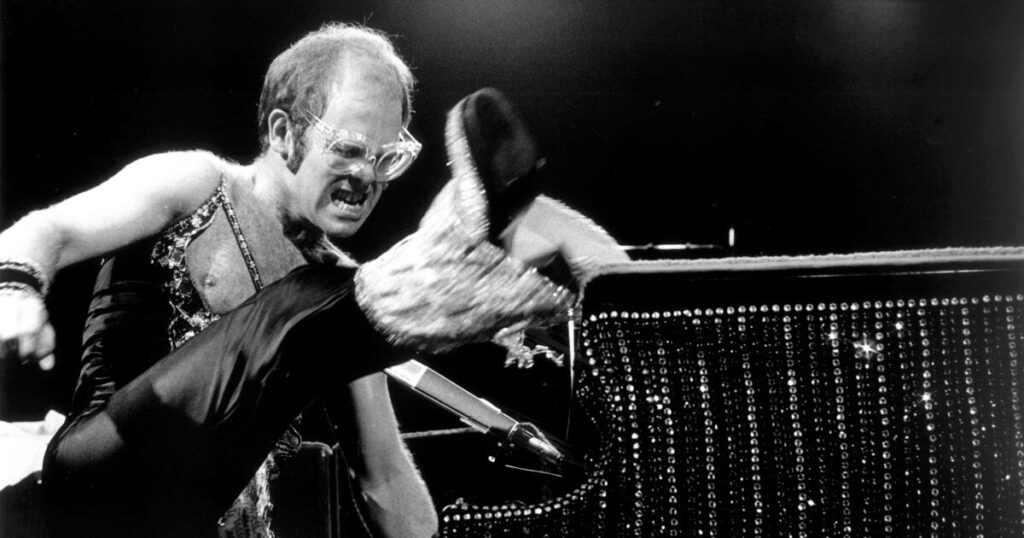[ad_1]
Elton John admired many things about John Lennon, but one quality really inspired him early in their friendship: the fact that the former Beatle still loved making music, was still politically active — and still had a purpose.
“I love people like that,” John states in a new documentary. “I love people who think about tomorrow rather than yesterday.”
“Elton John: Never Too Late” is, of course, very much an exercise in thinking about yesterday. Over the last five years, John has authorized a biopic (“Rocketman”) and written a memoir (“Me”). For the Disney+ documentary, he gave buzzy celebrity profiler R.J. Cutler — who co-directed the film with David Furnish, John’s husband — unfettered access to his photo and video archives as well as the extremely candid interview tapes that formed the basis of his memoir.
“I don’t look back normally,” John admits in a Zoom interview, “but for this film, I’ve had to.”
He sees the three autobiographical projects as distinct entities: “There’s a fantasy [‘Rocketman’], there’s a book of truth, and this, which is the truth on camera. So they’re three different things — but I don’t think there’s much more that I can say about my life that hasn’t been already told after this.”
He’s very happy with all three, John says, but he had a difficult time watching some of the footage of himself at the peak of his early success — knowing full well that he was either “high as a kite,” to borrow a Bernie Taupin line, or severely depressed and lonely.
“I’m not good at watching myself anyway,” he says, “so I was squirming in my seat.”
But when he saw the finished film at the Toronto International Film Festival in September, “I really liked it,” he says. “You know what I loved was the original …” — he interjects his thought — “I’m not very good at praising my own music. I don’t listen to it. I move on if I can. But the early work from 1970 to 1975 with the orchestral trio of albums — ‘Elton John,’ ‘Tumbleweed’ and ‘Mad Man’ — I was thinking: These are such good records. These are great songs.”
“So I was very happy about that,” John continues, “and I was really satisfied and happy with the final documentary. I’ve seen it twice — and I probably won’t watch it ever again.”
Furnish and Cutler, also on the Zoom call, both laugh. The two directors were the safe cushions that allowed John to expose some of the darker and sadder corners of his past: the abject cruelty of his parents, his repressed homosexuality, the self-destructive stupor of cocaine and alcohol he put himself in while his career was taking a rocket to the top of the pops.
In one archival interview, conducted at the height of his hot streak, a visibly dejected John — his shaggy rock-star hair a wild spectrum of orange and green — averts his gaze and says: “It sounds really strange, but I just do not have any ambitions now. I’m sort of plodding on at the moment.”
“I sat there, and I didn’t know,” John says, reflecting. “I thought: What next? I’d hit the heights. I thought I’d done everything there was to do — of course I hadn’t, but I didn’t realize it, because I was young, I was naive.”
“And you were heartbroken,” Furnish chimes in.
The backdrop to this viscerally low moment was the infidelity of and subsequent breakup with John’s manager and first love, John Reid.
“Well, I was heartbroken, yeah,” John replies. “I was an unhappy soul. I’d been spurned. And, you know, I’m a very romantic person. I love playing onstage, but when I came offstage I was stuck with the fact that I was on my own — and yet the person who I was with is still managing me. It was a very weird situation.”
The film is framed around this complicated rise to fame, which culminated with John’s concert at Dodger Stadium in 1975, and it climaxes with his bold decision, in 1976, to reveal his sexuality in a famous Rolling Stone interview — of which the audiotapes and candid photos were discovered in the process of making this documentary.
Cutler and Furnish highlighted the parallel between John’s coming out and his decision to retire from touring last year; the film is dotted with new footage of the farewell tour — which, fittingly, culminated in his 2022 return to Dodger Stadium.
“We realized the spine of the film could be these final months,” says Cutler, “while the nervous system wrapped around the spine could be those first five years. And there could be these incredible resonances.”
John was such a massive cultural figure in 1974 that he persuaded Lennon to make a belated return to the stage in a sold-out show at Madison Square Garden that November. Previously unseen photographs and audio recordings bring that night to life in the documentary — a personal thrill for Cutler, who actually attended the concert when he was 13.
The former Beatle was estranged from Yoko Ono at the time and wasn’t aware she was in the crowd, which roared like mad when Lennon appeared. The two reunited that very night.
“And if you do the math,” says Cutler, “it’s likely that Sean [Lennon] was conceived that night.”
“Maybe we should have played ‘Come Together,’” quips Elton John.
[ad_2]
Source link

